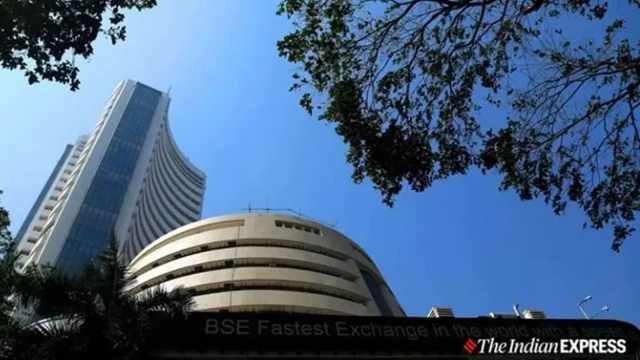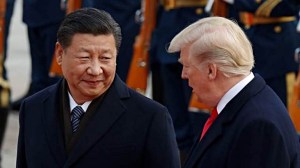Sensex, Nifty ride out US tariff announcement, end marginally lower
Indian Information Technology (IT) companies that have significant exposure to the US saw heavy selling pressure during the day.
 The IT and auto sectors experienced selling pressure due to US slowdown concerns and disruptions in the supply chain. (Express file photo)
The IT and auto sectors experienced selling pressure due to US slowdown concerns and disruptions in the supply chain. (Express file photo)Despite a higher-than-expected announcement of reciprocal tariffs by US President Donald Trump, domestic stock markets gave a muted response, with Sensex and Nifty ending marginally lower.
The BSE’s Sensex fell 0.42 per cent, or 322.08 points, to end at 76,295.36. The index opened 805.58 points down but recovered later in the day. The Nifty 50 lost 0.35 per cent, or 82.25 points, to close at 23,250.1. After opening lower, markets witnessed mild recovery and continued to trade in a narrow range.
Indian Information Technology (IT) companies that have significant exposure to the US saw heavy selling pressure during the day.
President Trump announced his long-awaited reciprocal tariffs on various trading partners of the US. The increase in tariffs will impact the global economy and may result in retaliation from other countries.
India faces a 27 per cent hike in tariffs. However, the tariffs on India are lower than those on several Asian peers, including 36 per cent on Thailand and 32 per cent on Indonesia.
“These tariffs were more or less in line, except for the fact that there was an expectation that rates would be watered down and India may get some favour. However, this did not happen. Due to this Indian market fell initially tracking global markets,” said independent market analyst Ambareesh Baliga.
The tariffs imposed on India were higher than the 24 per cent duty on Japan, 25 per cent on South Korea, 24 per cent on Malaysia, 20 per cent on the European Union, and 10 per cent on the UK. Notably, Trump announced 32 per cent tariffs on Taiwan, a key chip manufacturing centre.
The US will impose a 10 per cent tariff on all countries from April 5, and an individualised reciprocal higher tariff on countries with which America has the largest trade deficits from April 9.
“With the announcement of higher-than-expected tariffs, global investor sentiment is likely to take a hit leading to heightened volatility, even as some countries may seek to negotiate a deal,” said Aditi Gupta, Economist, Bank of Baroda.
On the other hand, some countries are likely to reply with retaliatory tariffs, which can have dire consequences for the global economy. Hence, uncertainty is likely to remain the operative word for global markets in the coming days as well, she said.
“Robust domestic macroeconomic data and lower crude oil prices aided the broader market performance. Although the tariff presents short-term challenges, India’s economic resilience and bilateral trade agreement may help mitigate the overall impact,” said Vinod Nair, Head of Research, Geojit Investments Limited.
The IT and auto sectors experienced selling pressure due to US slowdown concerns and disruptions in the supply chain.
Nifty IT slumped 4.21 per cent. Persistent Systems lost the most at 9.75 per cent, followed by Coforge (7.81 per cent), Mphasis and TCS (3.97 per cent), HCL Technologies (3.87 per cent), and Tech Mahindra (3.73 per cent).
“The fallout of tariff threats by the US is a slowdown and uncertainty in spending. The Nifty IT Index has corrected nearly 20 per cent in the last three months due to concerns over the recession in the US and the tariff war. Investors are catching their breath and evaluating whether the negatives are already priced in,” said Sumit Pokharna, VP-Fundamental Research, Kotak Securities.
Pharmaceutical stocks benefited from being exempt from the tariffs.
Auto companies also faced some selling pressure, with Nifty Auto falling 1.14 per cent. Tata Motors was down 2.43 per cent, Bharat Forge fell 3.28 per cent and Balkrishna Industries lost 3.27 per cent.
Must Read
Buzzing Now
Apr 09: Latest News
- 01
- 02
- 03
- 04
- 05

























